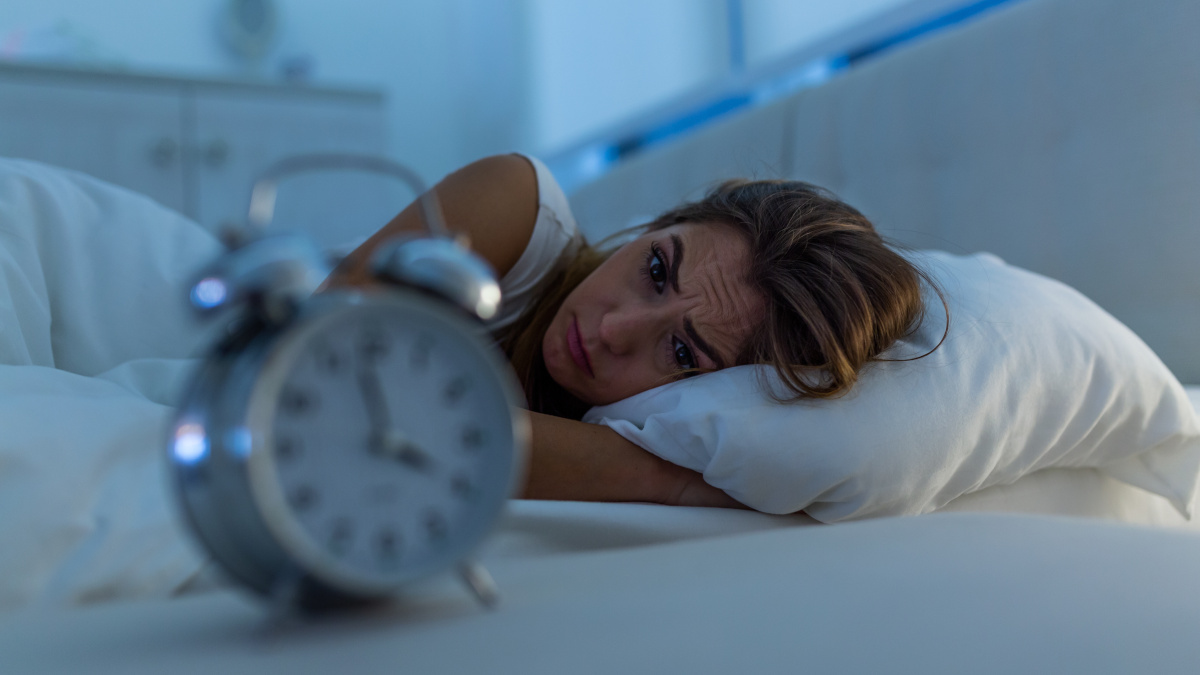Lack of melatonin: how do I know if I’m affected?
Think you might be lacking in melatonin? Find out how to tell if you’re deficient in this sleep hormone as well as how to naturally raise your blood levels.

Melatonin: the sleep hormone
Produced by the pineal gland in the brain, melatonin is also known as the sleep hormone. This is because it is produced by the body to encourage drowsiness (1), as natural light fades at the end of the day.
Melatonin production peaks between 2am and 3am, before gradually falling in the hours that follow, as levels of cortisol (also known as the ‘stress hormone’) rise. As night draws to an end, the crossing of the melatonin and cortisol curves prepares the body to be roused from sleep (2).
Melatonin is thus directly related to circadian rhythms, the alternating sleep/wake phases in a 24 hour cycle: this is the famous body clock which can be disrupted, for example, by travel to other time zones or irregular working hours.
Melatonin deficiency: what are the effects?
A lack of melatonin primarily affects sleep quality:
- difficulty falling asleep;
- waking up in the night and struggling to get back to sleep;
- disrupted sleep routine (going to bed late and waking up late);
- feeling tired when you wake up;
What’s more, as melatonin is similar to serotonin (known as the ‘feel-good hormone’), a lack of melatonin can cause mood problems, exacerbated by lack of sleep: it’s a vicious circle (3).
Similarly, a lack of melatonin can have a negative impact on our libido and sex life, which can also lead to mood problems, which in turn exacerbates the sex life issues, etc: it’s another vicious circle (4).
A melatonin deficit is therefore not something to shrug off lightly: it can have a significant effect on quality of life in general.
How can you tell if you’re short of melatonin?
If you often feel tired in the morning, it could be a sign of a sleep problem, potentially one caused by a lack of melatonin.
Tests are available to measure your melatonin levels. You can even buy home testing kits on-line which involve taking saliva or urine samples at various times during the day to establish your hormone levels (cortisol and melatonin) over a 24 hour period. However, their usefulness is limited, and if you’re suffering from persistent sleep problems, it’s best to seek advice from a health professional.
Why do we lack melatonin?
As we’ve seen, melatonin and cortisol are antagonist hormones: they have opposite effects. So it’s obvious that even though high levels of stress do not directly affect melatonin levels, they can reduce its potential, and thus cause the symptoms of melatonin deficiency (5).
While melatonin levels do not necessarily decline with age, several studies have found low melatonin levels in older people as well as in those suffering from sleep problems. However, this correlation has not yet been established as a causal link (6).
Conversely, menopause-induced hormone changes have been shown to affect melatonin production (7).
Furthermore, both shift work and jet lag disrupt our body clocks, producing the same effects as a lack of melatonin. In reality, it’s more a misalignment between circadian-governed melatonin levels and an imposed shift in the timing of sleep (8-9).
Finally, chronobiologists have in recent years demonstrated the impact of light on melatonin production. Our eyes are naturally ‘programmed’ to receive blue light in the morning. As the day progresses, this light gets warmer until it reaches ‘peak warmness’ at the end of the day, as the sun goes down. It’s this organisation of light throughout the day that controls the brain’s production of melatonin (10).
As a result, exposure to blue light in the evening from computer, tablet and smartphone screens is recognised as having a direct effect on melatonin levels and sleep rhythms.
How can you increase your melatonin levels?
One of the first things to do to address a lack of melatonin, or disruption to its production, is to adjust your light exposure. Instigating a self-imposed ‘screen curfew’ in the evening should be seriously considered. Or, at the very least, installing software filters on computers, tablets and smartphones to ensure more blue light exposure in the morning and more warm light in the evening.
In addition, melatonin is synthesised by the body from an amino acid called tryptophan. To naturally boost your melatonin levels, it can therefore help to eat foods rich in tryptophan such as bananas, walnuts, almonds, hazelnuts, etc, as well as tuna, mackerel and wholegrains. (11)
Tryptophan can also be taken in the form of a dietary supplement (such as L-Tryptophan).
Last but not least, a course of melatonin supplements is often recommended to help cut the time it takes to fall asleep and alleviate the subjective effects of jet lag.
Which melatonin supplement should you take?
Melatonin in spray form
Melatonin can be taken in the form of a water and glycerine sublingual spray (such as Melatonin Spray). This under-the-tongue method of administration ensures fast, effective absorption through the oral mucosa.
Melatonin in capsule form
It’s easier to take a precise dose with melatonin capsules, (such as the product Melatonin 1mg). The recommended dose is normally 2 capsules in the evening, an hour before bed, though this dose can be adjusted if waking up is difficult. A dose of just one capsule the following week should suffice.
A synergistic formulation
There are also many individuals who benefit from synergistic formulations combining melatonin with valerian, hawthorn and hop (a plant from the same family as hemp), which promote good quality sleep, as well as passiflora and California poppy, which induce relaxation. Together, and in synergy with melatonin (as in the supplement Advanced Sleep Formula), these calming plants help to restore a better quality of sleep – and life.
4 Days
very good expereince
very good expereince
Jelena Đaković
4 Days
Very good products.
Very good products.
Agnes BENDSAK
6 Days
Just OK
Just OK, ordering from company for many years and being safisfied
Lynn Mae
7 Days
Recomendo
Produtos encomendados são recebidos atempadamente e de acordo com o anunciado! Muito satisfeita!
Carla Sofia
7 Days
Everything is great!
Everything is great!
Jonas
12 Days
The delivery was fast and the product…
The delivery was fast and the product is great
SOMMARIVA Gianni
13 Days
Great service and lots of information
Great service and lots of information
Gabi
16 Days
Service Satisfaction
I’m satisfied with the service; it fulfilled what it set out to do.
Anfhony Abreu
19 Days
Original product and fast delivery
Original product and fast delivery. I haven't started it yet, but will do soon.
Vincenza Catania
22 Days
Good quality
Good quality. Good service.
Leonel Guzman
24 Days
Top!!!!!!!!
Top!!!!!!!!
Michael
26 Days
Excellent!
Products are great and delivered fast!
PARDINI Debora
27 Days
From order to receive the product
From order to receive the product, the process is smooth & fast. It’s good to customers.
WONG Mei Ling
28 Days
Fast delivery
very quick delivery to italy. product is good.
Customer
29 Days
Prompt delivry !!👍
Prompt delivry !!👍
SWEET Christine
of experience
your money back
##montant## purchase




